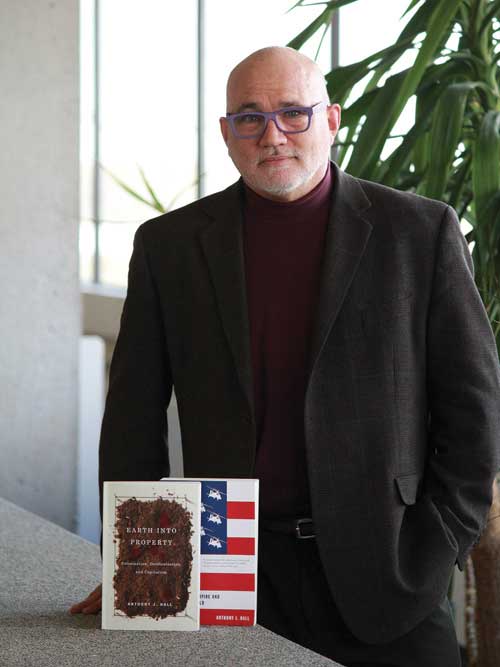"It is 1971. I have just turned twenty. The soles of my weathered Canadian boots are being hit from below by splashes of flying red mud. Then the road's texture changes from oozing muck to industrial-grade gravel as I chug along on my single-cylinder, British-made motorcycle – a BSA 250."
So begins the narrative of Dr. Tony Hall, inviting the reader along for a ride as he surges into the second volume of his Bowl with One Spoon project. Earth Into Property: Colonization, Decolonization and Capitalism is the culmination of a 16-year endeavour that began with the critically acclaimed first volume, The American Empire and the Fourth World. He officially launches the release of this second book, supported by a grant from the University of Lethbridge, at a Bookstore event on Thursday, Apr. 14, from 4 to 6 p.m.

Hall draws on a massive body of research to produce this second volume as he explores the multiple facets of globalization, adeptly linking the crises and events of today's world with their deeply embedded historical roots.
"My field was history but when I started to teach, I felt people just didn't know why they should care about the past, it wasn't obvious to them," says Hall, now a professor of globalization studies at the U of L. "So I took the approach whereby we'd look at an issue right here, right now and then show it in the context of history. These issues we are dealing with didn't just emerge yesterday."
In fact Hall draws from all of his experience, and it is that personal perspective and passion that pulls readers into his argument. He first came to the University of Lethbridge to teach in the Native American Studies department, working in that capacity from 1990 to 2002. His interest in Indigenous peoples and colonization, dating back to Christopher Columbus in 1492, set the groundwork for Bowl with One Spoon.
He soon recognized that Canadian and North American Aboriginal history was not an isolated tale. The opening to Earth Into Property recounts his trip to Africa in 1971, where he saw first-hand the effects of colonization and supposed decolonization of Uganda and Congo. It resonated with our local history.
"Although the book is a global interpretation, it's really rooted in a Canadian perspective," says Hall.
"I'm proud of the fact and want it understood that I never left my original subject, and I think what I've done here, is put the story of Indigenous peoples – and their encounter with the empire builders of North America and the secessionists of the British empire who founded the United States – at the centre of a global story."
Introducing the word "capitalism" into the title of volume two was also a bold statement.
"As I worked on the history of the colonization in North America, as characterized by the transfer of land and resources away from the Indigenous peoples, it occurred to me that this is actually a very big part of the history of capitalism, and capitalism is a big and important subject," says Hall. "That's how I started to see this as a history of capitalism."
The two volumes are independent works and can stand on their own as separate entities, but consistent currents run through the pair.
"Both volumes are self-contained," he says in Earth Into Property, "written to be read independently of the other. I hope, however, that the two books together constitute a literary oeuvre whose scale of significance is larger than the sum of its parts."
It's a discussion he furthers through globalization studies and one he continually pushes to the surface. Recognizing his views can be polarizing, he does not shrink from the responsibility he feels he has to academia.
"I look forward to sharing with my colleagues, in Earth into Property, the depth of historical research and analysis that inform my reading of current events and contemporary politics," says Hall. "I hope to set the record straight on the factual basis underlying some of my interpretations, which may seem unusual or even radical when stripped of their historical context."
GET THE FACTS
· Globalization Studies was first created by Hall in 2003, with the first course offered entitled Globalization Since 1492.
· The Independent (UK) has dubbed Earth Into Property as one of the best books of 2010.
· Hall will also announce the establishment of an annual scholarship at the Feb. 14 book launch. In honour of Tooker Gomberg, whom Hall says, "gave me a lot of inspiration and help in the early days of globalization studies," the award will go to, "a student in the humanities and social sciences who most adeptly engages public controversy for public good."
· The final chapter of Earth Into Property, From General Motors to AIG to the Bowl with One Spoon: Reading the Financial Crisis, is what Hall calls his most in depth investigative journalism as he theorizes on the root causes of the 2008 financial debacle.
